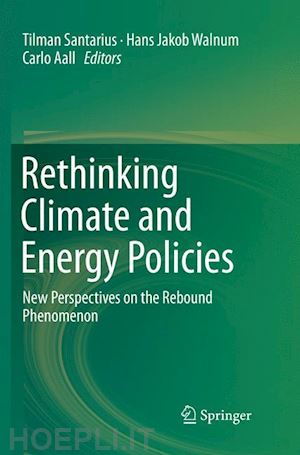
Questo prodotto usufruisce delle SPEDIZIONI GRATIS
selezionando l'opzione Corriere Veloce in fase di ordine.
Pagabile anche con Carta della cultura giovani e del merito, 18App Bonus Cultura e Carta del Docente
This book calls for rethinking current climate, energy and sustainability policy-making by presenting new insights into the rebound phenomenon; i.e., the driving forces, mechanisms and extent of rebound effects and potential means of mitigating them. It pursues an innovative and novel approach to the political and scientific rebound discourse and hence, supplements the current state-of-knowledge discussed in the field of energy economics and recent reports by the Intergovernmental Panel on Climate Change.
Building on central rebound publications from the past four decades, this book is divided into three main sections: Part I highlights new aspects of rebound economics by presenting insights into issues that have so far not been satisfactorily researched, such as rebounds in countries of the Global South, rebounds on the producer-side, and rebounds from sufficiency behaviour (as opposed to rebounds from technical efficiency improvements). In turn, Part II goes beyond conventional economic rebound research, exploring multidisciplinary perspectives on the phenomenon, in particular from the fields of psychology and sociology. Advancing such multidisciplinary perspectives delivers a more comprehensive understanding of rebound’s driving forces, mechanisms, and policy options. Part III puts rebounds into practice and presents several policy cases and sector-specific approaches, including the contexts of labour markets, urban planning, tourism, information and communication technologies, and transport. Lastly, the book embeds the issue into the larger debate on decoupling, green growth and degrowth, and identifies key lessons learned for sustainable development strategies and policies at large. By employing such varied and in-depth analyses, the book makes an essential contribution to the discussion of the overall question: Can resource-, energy-use and greenhouse gas emissions be substantially reduced without hindering economic growth?
Introduction – Rebound Research in a Warming World.- After 35 Years of Rebound Research in Economics: Where do We Stand?.- Indirect Effects from Resource Sufficiency Behaviour in Germany.- The Global South: New Estimates and Insights from Urban India.- Production-side Effects and Feedback Loops Between the Micro and Macro-Level..- Exploring Rebound Effects from a Psychological Perspective.- Towards a Psychological Theory and Comprehensive Rebound Typology.-











Il sito utilizza cookie ed altri strumenti di tracciamento che raccolgono informazioni dal dispositivo dell’utente. Oltre ai cookie tecnici ed analitici aggregati, strettamente necessari per il funzionamento di questo sito web, previo consenso dell’utente possono essere installati cookie di profilazione e marketing e cookie dei social media. Cliccando su “Accetto tutti i cookie” saranno attivate tutte le categorie di cookie. Per accettare solo deterninate categorie di cookie, cliccare invece su “Impostazioni cookie”. Chiudendo il banner o continuando a navigare saranno installati solo cookie tecnici. Per maggiori dettagli, consultare la Cookie Policy.